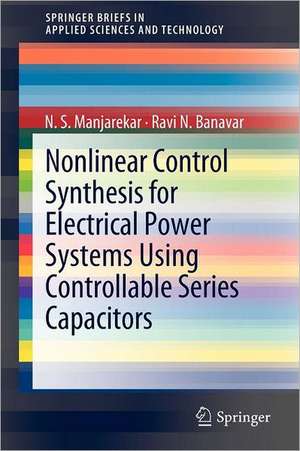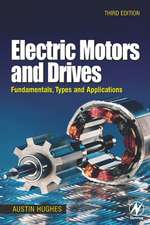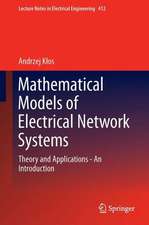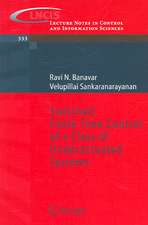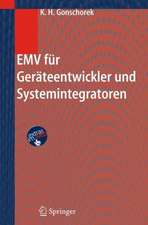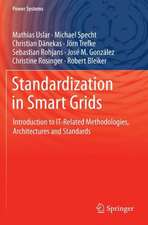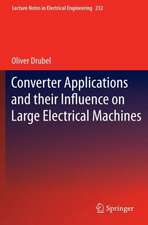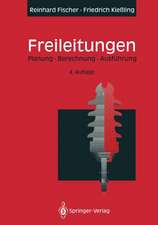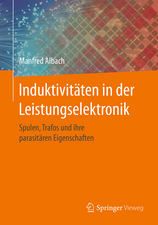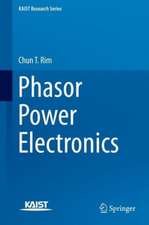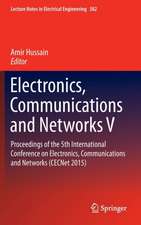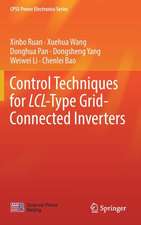Nonlinear Control Synthesis for Electrical Power Systems Using Controllable Series Capacitors: SpringerBriefs in Applied Sciences and Technology
Autor N. S. Manjarekar, Ravi N. Banavaren Limba Engleză Paperback – 15 feb 2012
electrical power systems using two nonlinear control synthesis techniques.
For this transient stabilization problem the actuator considered is
a power electronic device, a controllable series capacitor (CSC).
The power system is described using two different nonlinear models - the second order swing equation and the third order flux-decay model.
To start with, the CSC is modeled by the injection model which is
based on the assumption that the CSC dynamics is very fast as compared to the dynamics of the power system and hence can be approximated by an algebraic equation. Here, by neglecting the CSC dynamics, the input vector $g(x)$ in the open loop system takes a
complex form - the injection model. Using this model, interconnection and damping assignment passivity-based control (IDA-PBC)
methodology is demonstrated on two power systems: a single machine infinite bus (SMIB) system and a two machine system.
Further, IDA-PBC is used to derive stabilizing controllers for power systems, where the CSC dynamics are included as a first order system.
Next, we consider a different control methodology, immersion and invariance (I\&I), to synthesize an asymptotically stabilizing control law for the SMIB system with a CSC. The CSC is described by a first order system. As a generalization of I\&I, we incorporate the power balance algebraic constraints in the load bus to the
SMIB swing equation, and extend the design philosophy to a
class of differential algebraic systems. The proposed result is then demonstrated on another example: a two-machine
system with two load buses and a CSC. The controller performances are validated through simulations for all cases.
Din seria SpringerBriefs in Applied Sciences and Technology
- 20%
 Preț: 326.28 lei
Preț: 326.28 lei - 17%
 Preț: 360.33 lei
Preț: 360.33 lei -
 Preț: 479.67 lei
Preț: 479.67 lei -
 Preț: 378.12 lei
Preț: 378.12 lei -
 Preț: 409.43 lei
Preț: 409.43 lei -
 Preț: 344.90 lei
Preț: 344.90 lei - 20%
 Preț: 225.31 lei
Preț: 225.31 lei -
 Preț: 376.59 lei
Preț: 376.59 lei -
 Preț: 444.52 lei
Preț: 444.52 lei -
 Preț: 378.12 lei
Preț: 378.12 lei -
 Preț: 377.18 lei
Preț: 377.18 lei -
 Preț: 355.48 lei
Preț: 355.48 lei -
 Preț: 344.90 lei
Preț: 344.90 lei -
 Preț: 380.07 lei
Preț: 380.07 lei -
 Preț: 380.07 lei
Preț: 380.07 lei -
 Preț: 356.42 lei
Preț: 356.42 lei -
 Preț: 382.95 lei
Preț: 382.95 lei -
 Preț: 376.59 lei
Preț: 376.59 lei -
 Preț: 380.29 lei
Preț: 380.29 lei - 20%
 Preț: 288.73 lei
Preț: 288.73 lei - 20%
 Preț: 322.17 lei
Preț: 322.17 lei - 20%
 Preț: 293.83 lei
Preț: 293.83 lei -
 Preț: 273.63 lei
Preț: 273.63 lei - 15%
 Preț: 462.51 lei
Preț: 462.51 lei -
 Preț: 410.85 lei
Preț: 410.85 lei -
 Preț: 382.95 lei
Preț: 382.95 lei -
 Preț: 355.92 lei
Preț: 355.92 lei -
 Preț: 378.12 lei
Preț: 378.12 lei -
 Preț: 264.79 lei
Preț: 264.79 lei -
 Preț: 312.68 lei
Preț: 312.68 lei -
 Preț: 380.07 lei
Preț: 380.07 lei -
 Preț: 356.45 lei
Preț: 356.45 lei -
 Preț: 382.32 lei
Preț: 382.32 lei - 20%
 Preț: 324.64 lei
Preț: 324.64 lei -
 Preț: 412.30 lei
Preț: 412.30 lei -
 Preț: 378.12 lei
Preț: 378.12 lei -
 Preț: 355.65 lei
Preț: 355.65 lei -
 Preț: 415.18 lei
Preț: 415.18 lei -
 Preț: 195.87 lei
Preț: 195.87 lei -
 Preț: 379.09 lei
Preț: 379.09 lei - 20%
 Preț: 386.11 lei
Preț: 386.11 lei -
 Preț: 381.98 lei
Preț: 381.98 lei -
 Preț: 377.57 lei
Preț: 377.57 lei - 20%
 Preț: 301.85 lei
Preț: 301.85 lei -
 Preț: 380.07 lei
Preț: 380.07 lei -
 Preț: 261.91 lei
Preț: 261.91 lei -
 Preț: 376.22 lei
Preț: 376.22 lei -
 Preț: 377.95 lei
Preț: 377.95 lei -
 Preț: 379.68 lei
Preț: 379.68 lei -
 Preț: 374.30 lei
Preț: 374.30 lei
Preț: 377.18 lei
Nou
Puncte Express: 566
Preț estimativ în valută:
72.19€ • 75.07$ • 60.41£
72.19€ • 75.07$ • 60.41£
Carte tipărită la comandă
Livrare economică 14-28 martie
Preluare comenzi: 021 569.72.76
Specificații
ISBN-13: 9783642275302
ISBN-10: 3642275303
Pagini: 111
Ilustrații: XI, 90 p. 36 illus.
Dimensiuni: 155 x 235 x 10 mm
Greutate: 0.16 kg
Ediția:2012
Editura: Springer Berlin, Heidelberg
Colecția Springer
Seria SpringerBriefs in Applied Sciences and Technology
Locul publicării:Berlin, Heidelberg, Germany
ISBN-10: 3642275303
Pagini: 111
Ilustrații: XI, 90 p. 36 illus.
Dimensiuni: 155 x 235 x 10 mm
Greutate: 0.16 kg
Ediția:2012
Editura: Springer Berlin, Heidelberg
Colecția Springer
Seria SpringerBriefs in Applied Sciences and Technology
Locul publicării:Berlin, Heidelberg, Germany
Public țintă
ResearchTextul de pe ultima copertă
In this work we derive asymptotically stabilizing control laws for
electrical power systems using two nonlinear control synthesis techniques.
For this transient stabilization problem the actuator considered is
a power electronic device, a controllable series capacitor (CSC).
The power system is described using two different nonlinear models - the second order swing equation and the third order flux-decay model.
To start with, the CSC is modeled by the injection model which is
based on the assumption that the CSC dynamics is very fast as compared to the dynamics of the power system and hence can be approximated by an algebraic equation. Here, by neglecting the CSC dynamics, the input vector $g(x)$ in the open loop system takes a
complex form - the injection model. Using this model, interconnection and damping assignment passivity-based control (IDA-PBC)
methodology is demonstrated on two power systems: a single machine infinite bus (SMIB) system and a two machine system.
Further, IDA-PBC is used to derive stabilizing controllers for power systems, where the CSC dynamics are included as a first order system.
Next, we consider a different control methodology, immersion and invariance (I\&I), to synthesize an asymptotically stabilizing control law for the SMIB system with a CSC. The CSC is described by a first order system. As a generalization of I\&I, we incorporate the power balance algebraic constraints in the load bus to the
SMIB swing equation, and extend the design philosophy to a
class of differential algebraic systems. The proposed result is then demonstrated on another example: a two-machine
system with two load buses and a CSC. The controller performances are validated through simulations for all cases.
electrical power systems using two nonlinear control synthesis techniques.
For this transient stabilization problem the actuator considered is
a power electronic device, a controllable series capacitor (CSC).
The power system is described using two different nonlinear models - the second order swing equation and the third order flux-decay model.
To start with, the CSC is modeled by the injection model which is
based on the assumption that the CSC dynamics is very fast as compared to the dynamics of the power system and hence can be approximated by an algebraic equation. Here, by neglecting the CSC dynamics, the input vector $g(x)$ in the open loop system takes a
complex form - the injection model. Using this model, interconnection and damping assignment passivity-based control (IDA-PBC)
methodology is demonstrated on two power systems: a single machine infinite bus (SMIB) system and a two machine system.
Further, IDA-PBC is used to derive stabilizing controllers for power systems, where the CSC dynamics are included as a first order system.
Next, we consider a different control methodology, immersion and invariance (I\&I), to synthesize an asymptotically stabilizing control law for the SMIB system with a CSC. The CSC is described by a first order system. As a generalization of I\&I, we incorporate the power balance algebraic constraints in the load bus to the
SMIB swing equation, and extend the design philosophy to a
class of differential algebraic systems. The proposed result is then demonstrated on another example: a two-machine
system with two load buses and a CSC. The controller performances are validated through simulations for all cases.
Caracteristici
Presents Nonlinear Control Synthesis for Electrical Power Systems Written by leading experts in the field
